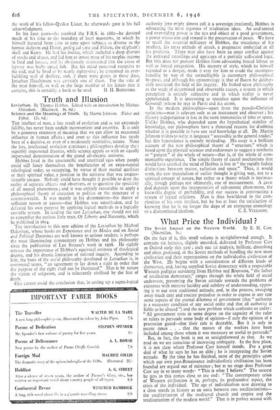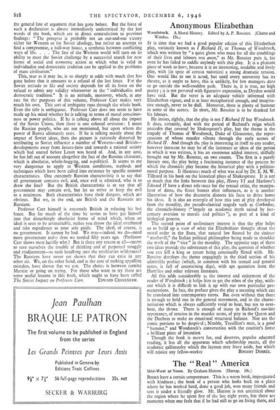What Price the Individual ?
The Soviet Impact on the Western World. By E. H. Carr.
(Macmillan. 5s.) ON the face of it, this small volume is straightforward enough. It contains six lectures, slightly amended, delivered by Professor Carr in Oxford early this year ; each one an analysis, brilliant, disturbing and often profound, of the Soviet methods of handling the new mass civilisation and their repercussions on the individualist civilisation of the West. He begins with a consideration of different kinds of democracy, and, having supplied Soviet democracy with a respectable Western pedigree stemming from Hobbes and Rousseau, "the father of totalitarian democracy," ranges through the whole field of social endeavour, presenting the Soviet attitude towards the problems of existence with extreme lucidity and subtlety of understanding, oppos- ing it to our own traditional attitude, and, in the process, sweeping away much cant and routine prejudice in order to expose at any rate some aspects of the eternal dilemma of government (that "authority is a necessary condition of any social order and that all authority is liable to be abused ") and the new problem which confronts us today : "All government rests in some degree on the capacity of the ruler or rulers to persuade some body of opinion—if only the opinion of a praetorian guard—that their rule is desirable. But it is only in recent times . . . that the masses of the workers have been included among those whom it was necessary or useful to persuade."
But, in fact, the book is not as straightforward as that. As we read on we are conscious of increasing ambiguity. In the first place, it is not clear where Professor Carr himself stands. For a great deal of what he says he has an alibi; is interpreting the Soviet attitude. By the time he has finishe, most of the principles upon which our own post-Renaissance individualistic civilisation has been founded are argued out of existence ; but at no stage does Professor Carr say in so many words! "This is what I believe." The nearest he gets to this comes close to me end : "The contemporary crisis of Western civilisation is in, perhaps, its profoundest aspect, the crisis of the individual. The age of individualism now drawing to a close stands in history as an oasis between two totalitarianisms- the totalitarianism of the mediaeval church and empire and the totalitarianism of the modern world." That is in perfect accord with the general line of argument that has gone before. But the force of such a declaration is almost immediately undermined by the last words of the book, which are in direct contradiction to previous findings: "The prospect is probably not an out-and-out victory either for Western or for Soviet ideology, but rather an attempt to find a compromise, a half-way house, a synthesis between conflicting ways of life. . . . The fate of the Western world will turn on its ability to meet the Soviet challenge by a successful search for new forms of social and economic action in which what is valid in individualist and democratic tradition can be applied to the problems of mass civilisation."
This, true as it may be, is so sharply at odds with much that has gone before that it amounts to a refusal of the last fence. For the Soviet attitude to life and society depends for all its force on the refusal to admit any validity whatsoever in the "individualist and democratic tradition." It is an attitude, moreover, which, at any rate for th purposes of this volume, Professor Carr makes very much his own. This sort of ambiguity runs through the whole book. Even the title is ambiguous. Professor Carr does not seem to have made up his mind whether he is talking in terms of moral conscious- ness or power politics. If he is talking above all about the impact of the Soviet Union, then there is one colossal omission: I mean the Russian people, who are not mentioned, but upon whom the power of Russia ultimately rests. If he is talking mainly about the impact of Soviet ideas, then the picture is curiously distorted by attributing to Soviet influence a number of Western—and British— developments away from laissez-faire and towards a rational society which had started before Lenin was heard of. And, in any case, he has left out of account altogether the fact of the Russian character, which is absolutist, whole-hogging, and a-political. It seems to me very dangerous to apply to Western conditions, methods and techniques which have been called into existence by specific national characteristics. One extremely Russian characteristic is to say that all government contains evil, and, once evil is admitted, who is to draw the line? But the British characteristic is to say that all government may contain evil, but let us strive to keep the evil to a minimum. Both characteristics have their dangers, which are obvious. But we, in the end, are British and the Russians are Russians.
Professor Carr himself is extremely British in refusing his last fence. But for much of the time he seems to have got himself into that disturbingly absolutist frame of mind which, when an ideal is seen to be unattainable, makes you throw the ideal overboard and take expediency as your sole guide. The ideal, of course, is no government. It cannot be had. We may—indeed, we do—need more government today than we needed fifty years ago. (Professor Carr shows most lucidly why.) But is there any reason at all—except to save ourselves the trouble of thinking and of perpetual struggle and readjustment—to rush headlong into the totalitarian wilderness? The Russians have never yet shown that they can exist in any other air. We, on the other hand, and at the cost of making appalling mistakes, have shown that we can. The choice is between turning Marxist or going on trying. For those who want to try there are some useful lessons in this book, which ought to have been called The Soviet Impact on Profe.ssof Carr. EDWARD CRANKSHAW.



































 Previous page
Previous page